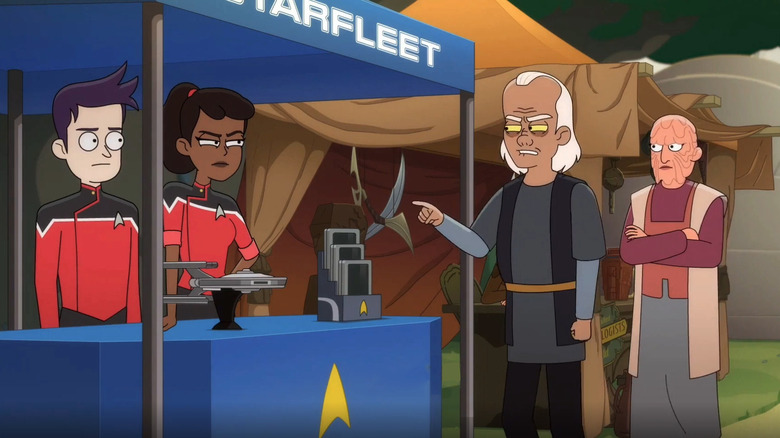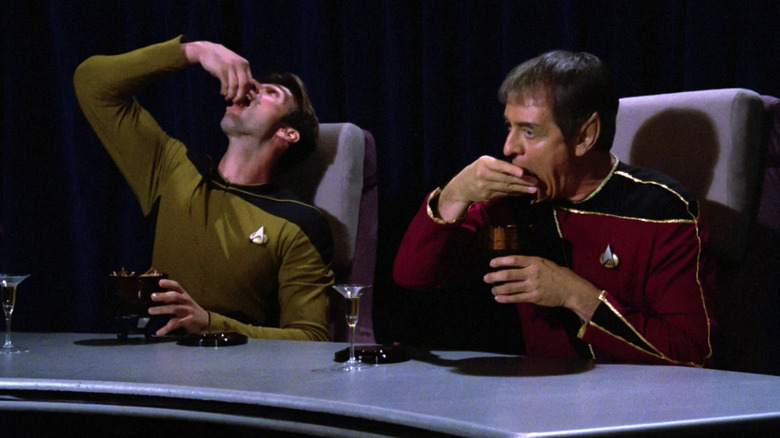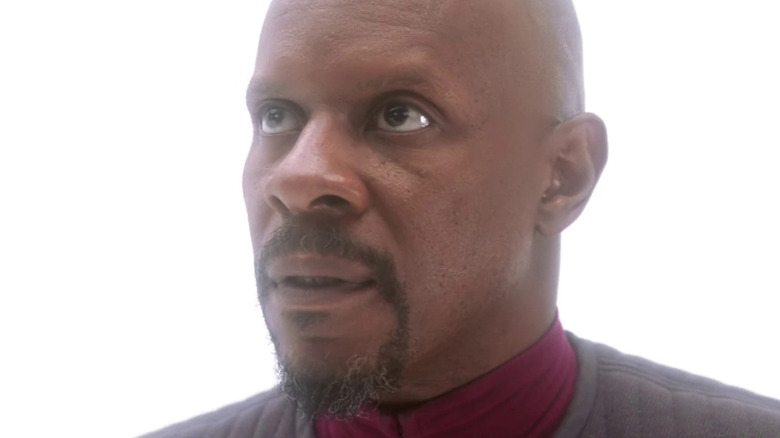In Star Trek: Lower Decks, Truthers Exist And They're Just As Annoying As The Real Version
This article contains spoilers for "Star Trek: Lower Decks" season 3, episode five, and for the finale of "Star Trek: Deep Space Nine."
Conspiracy truthers can be the worst. Sure, it's important to question authority and make up your own mind about things, but some people exist purely to be contrarian and turn their quest for knowledge into an excuse to provoke others. It's one thing to believe in conspiracy theories, and entirely something else to insist that everyone else believe them too. Truthers don't just want to share their beliefs, they want to convert everyone. Unfortunately, it appears that even in a future where all food can be replicated and most diseases can be treated with the push of a button, there are still truthers trying to poke holes in what's accepted as fact and they are just as annoying as the ones in our own world. Thankfully they don't seem to be peddling bogus health supplements, giving them one step up on Earth truthers.
In season 3, episode five of "Star Trek: Lower Decks," Ensigns Mariner (Tawny Newsome) and Boimler (Jack Quaid) are assigned to man a Starfleet booth during a job fair. While there, they must endure taunting from many of the other job fair participants, and eventually get frustrated with a pair of conspiracy theorists who want to know more about Starfleet with no intent of ever joining. They have some points about the wackiness Starfleet gets into, but they're also missing the big picture.
Sometimes in space, stuff just happens
The conspiracy truthers apparently have some bones to pick with Starfleet's officers and official handling of some unsavory events. They want to know the truth about what happened to Captain Benjamin Sisko (Avery Brooks) to begin with, but then start demanding answers about one of the more controversial episodes of "Star Trek: The Next Generation." They question Boimler and Mariner about "when parasites crawled into Starfleet Admirals butts and took over their brains," referring to the events of the season 1 episode "Conspiracy."
In "Conspiracy," Captain Picard (Patrick Stewart) is informed of the strange behavior and suspicious deaths of some Starfleet officers, and he takes the Enterprise to Earth to investigate further. On the way there, he's interrupted by a trio of Starfleet admirals, who invite the captain and his number one, Commander Riker (Jonathan Frakes) to dinner. The crew of the Enterprise eventually figure out that the admirals, along with some other Starfleet leadership, have been infected by a bug-like parasite that can control its host like a walking puppet. They manage to save most of the infected officers, though they end up shooting the assistant of one of the admirals, Remmick (Robert Schenkkan), who had just ingested the remaining parasite. There's a lot of phaser firing in "Star Trek," but it's rarely violent. In "Conspiracy," Remmick's head goes full "Scanners" and pops in a burst of blood and gore the moment the phasers hit it.
It's the meanest, most violent episode of "Star Trek: The Next Generation," so it's not really a surprise that Starfleet would try to bury what happened. Heck, even Boimler thinks it's just a "stupid conspiracy!"
Have a little faith
Mariner seems to know a bit more about the truths of Starfleet, and she regretfully informs Boimler that the whole butt-alien thing actually happened. She also has a quick answer for the question about Sisko: "He's working hard in the celestial temple." Just as the truthers represent some of the fans who didn't appreciate the meanness or gore of "Conspiracy," they also represent the fans who were sore about the finale of "Star Trek: Deep Space Nine," which saw Sisko being summoned to live inside of the wormhole in the "Celestial Temple" of the Bajoran prophets. The series ends with him leaving his family, including his unborn daughter, with no promise of when or if he will return. It's important in the grand scheme of things because of the power the prophets wield and their need for Sisko, but it also creates a lot of problems for the people left behind, including Starfleet. How exactly do you explain away one of your captains being the chosen one of an ancient religion?
The conspiracy truthers and the fans they represent should have a little faith, because "Star Trek" has always been and always will be about hope. Sisko's sacrifices will matter, and he will return one day, even if fans never get to see it. They have to just know it. C'mon, conspiracy theorists, isn't your whole thing that you're supposed to believe?
New episodes of "Star Trek: Lower Decks" premiere Thursdays on Paramount+.


